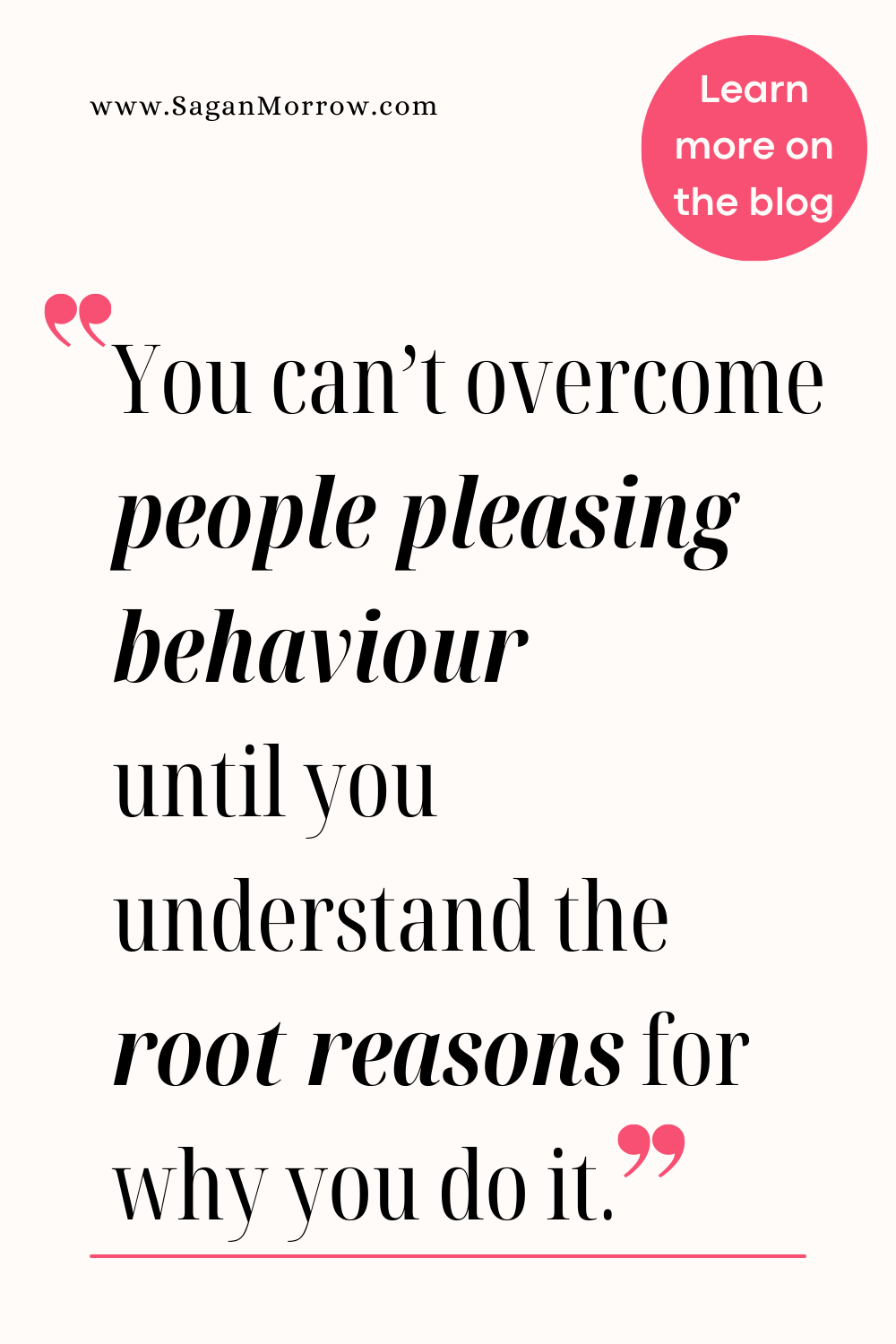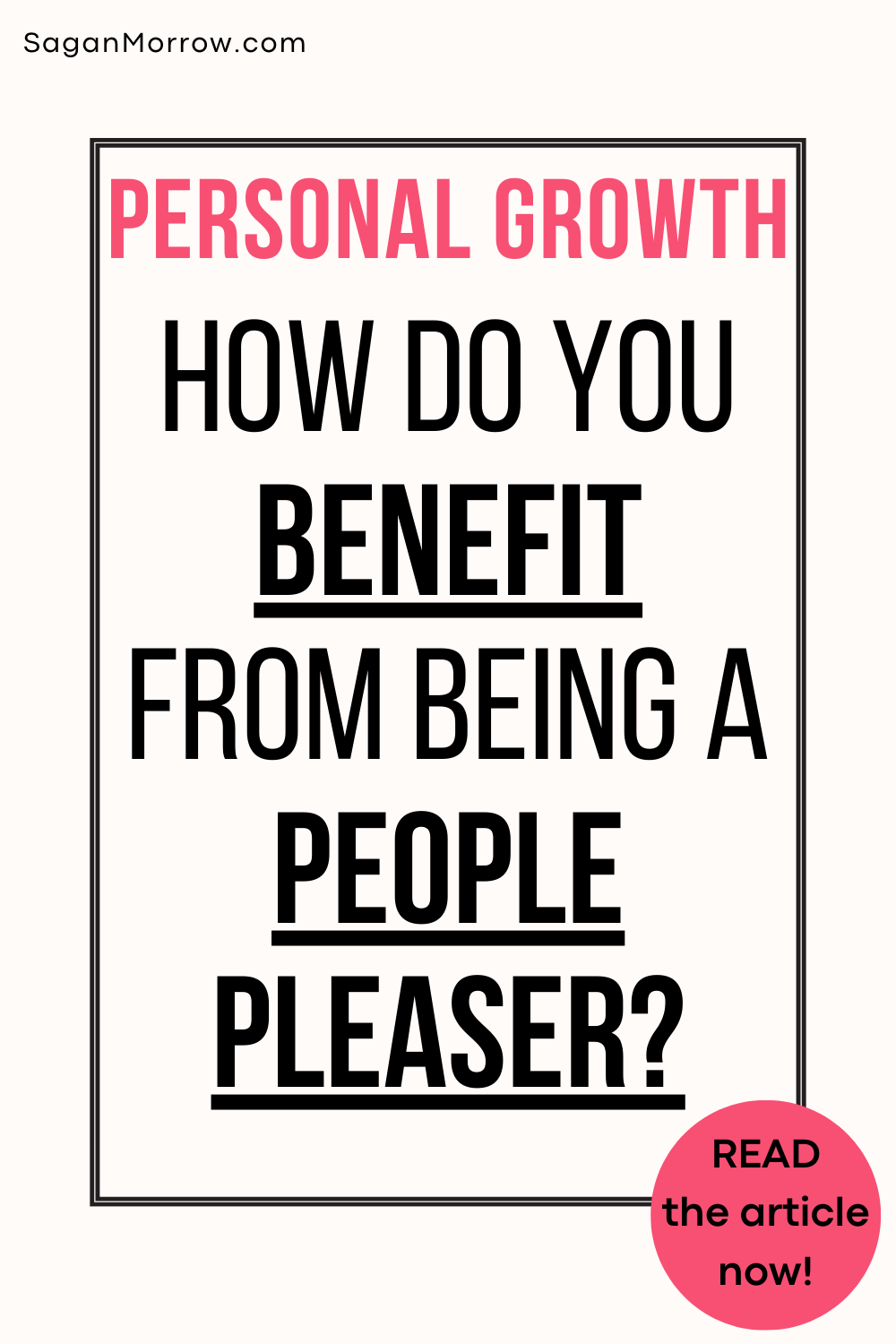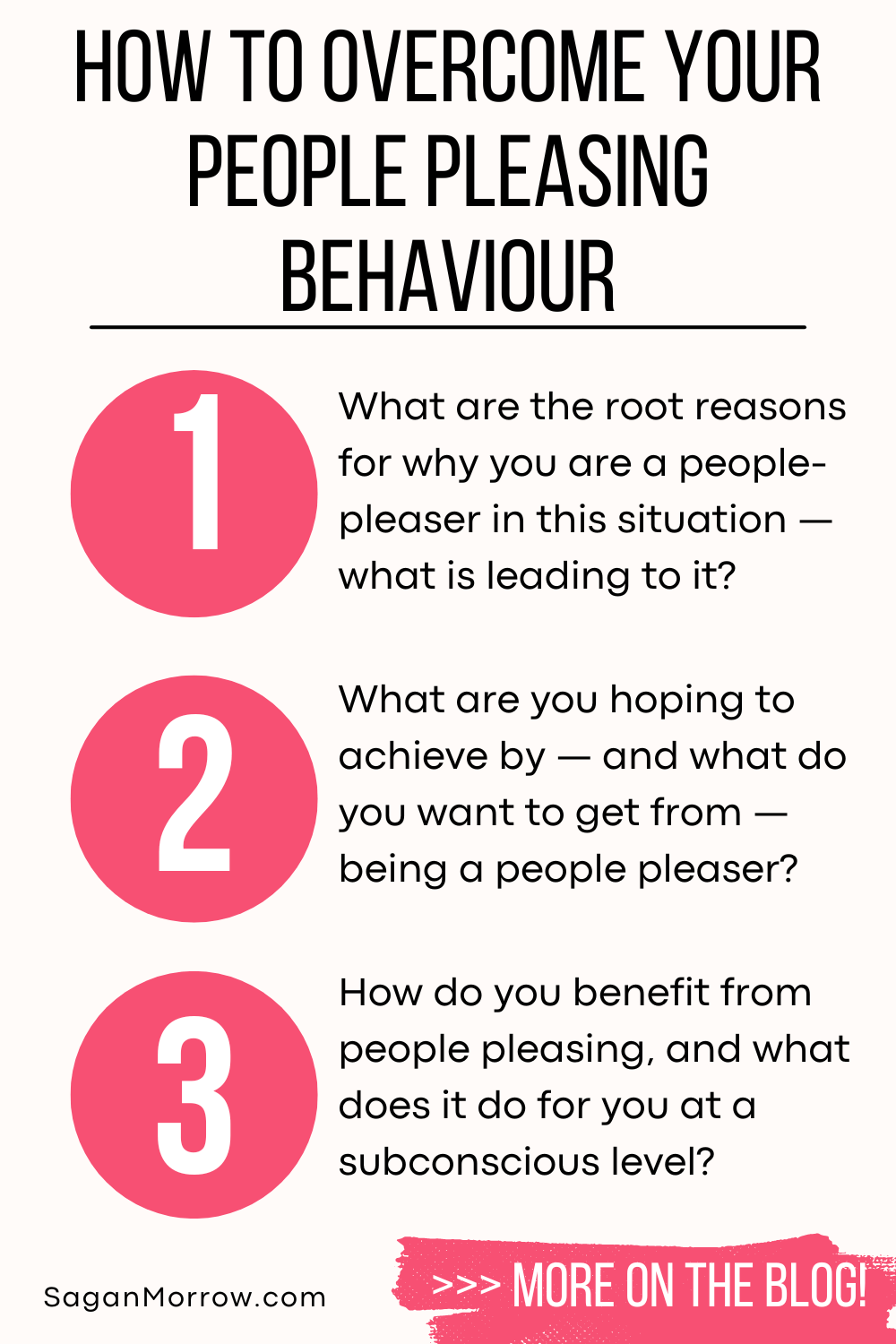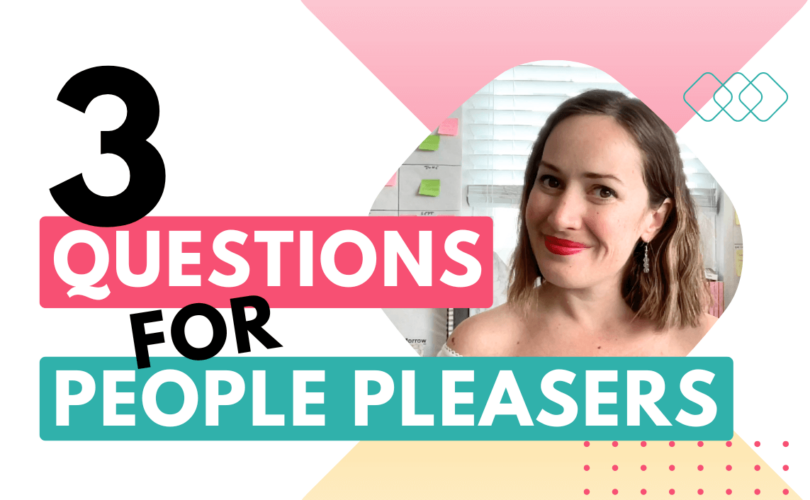How do you benefit from people pleasing? What is your motive for people pleasing? What is the main cause or root REASON for doing it, when you’re engaging in people pleasing behaviours?
If you are a people pleaser, these are all really important questions to explore!
People pleasing is getting in the way of achieving your goals and living life the way you truly want — and as such, the more that you understand your people pleasing behaviour at a deep level, the more you can work with it or even overcome people pleasing altogether.
And by the way... People pleasing behaviour can also severely hinder your progress in self improvement and personal development. So if you are on a personal growth journey, it’s especially important to address this issue!
Topics we address in this article:
- What is your MOTIVE: How do you benefit from people pleasing?
- Top 3 questions you need to explore!
- Commonalities between people pleasing, perfectionism, and procrastination (besides the fact that they all start with the letter P ;))
- Where to go from here:
- 3 questions to start thinking about the ways this is affecting your life.
- How you can get help overcoming people pleasing behaviour.
A condensed version of this article originally appeared as the Feb. 17, 2024 edition of the Solopreneur Diary Entries newsletter.
Wondering who I am to speak on this subject?
Hi, I'm Sagan — a life coach for people who are self-aware (my specialty is in personal fulfillment and anti-hustle solopreneur productivity).
Many of my clients struggle with behaviours like people pleasing when we first start working together, and thanks to our coaching sessions, they make incredible strides in overcoming it!
Watch the video version of this article:
Show notes for this people pleaser video:
- 0:00 Introduction to this People Pleasing video
- 0:59 Overview of what you'll get from this video
- 1:28 Quick intro to Sagan (your Life Coach for how to stop people pleasing!)
- 1:58 What are your MOTIVES for people pleasing?
- 2:39 Question 1 about your people-pleasing motivation
- 3:38 Question 2 about your people-pleasing motivation
- 5:03 Question 3 about your people-pleasing motivation
- 6:16 The power of asking these questions — and why it matters so much!
- 6:55 The commonalities between people pleasing, perfectionism, and procrastination
- 8:40 Top 3 questions to ask yourself
- 9:04 What to do if you're struggling with answering these questions OR if you want to take this to the next stage and DO something about your people pleasing behaviour, once and for all!
Earlier this year, I did a mini series on people pleasing:
- 5 signs you are a people pleaser
- Why doesn’t people pleasing work?
- How to STOP being a people pleaser and START putting yourself first
…So let’s build on that 3-part series for today’s article!
What is your motive for people pleasing?
As you can see, one of our original blog posts about people pleasing explored the question, “Why doesn’t people pleasing work?”
…And it’s worth taking a step back to look at what we mean by people pleasing “working” vs “not working.” This comes back to what your MOTIVE is for people pleasing, which is the real crux of the issue!
Here are some questions to help you explore this further:
#1: What is the main cause of your people pleasing behaviour, in this particular situation?
In other words: What is leading to your people pleasing tendencies? What are the root reasons for your people pleasing behaviours?
This may be situational:
For example, the reason why you people please in one type of environment or one scenario may not be the same reason why you people please in a different environment (such as at home vs in the workplace).
You might also find that your people pleasing behaviours show up differently when it’s people you already know intimately vs if it’s with people who you don’t have as close of a relationship with. Power dynamics can also play into this.
At this stage, you can simply look at WHERE people pleasing occurs in your life and WHO it occurs with — that way, you'll be able to begin identifying the more obvious patterns.
This is important to assess, because it will help you to pinpoint what’s going on beneath the surface level. And that leads us to question #2…

#2: What are you hoping to achieve by being a people pleaser?
In other words: What do you want to GET from people pleasing? If you want to overcome people pleasing, it’s essential to understand what motivates people pleasers — and that will change from one person to the next!
For example…
- If you are conflict-avoidant, you might people-please because it helps keep the peace.
- If you have a transactional perspective on relationships, you might be people pleasing because you want the other person to do things for you in return.
- If you have been socialized to be rewarded for “good” behaviour, you might do people pleasing for positive reinforcement.
- ...etc.
It could be a combination of those, or something else altogether — and depending on what your (probably subconscious) goal is by being a people-pleaser, that will ALSO affect what type of solution will work best to solve it.
By the way: You don’t have to figure out ANY of this on your own!
We can work through this together and understand how people pleasing affects you — plus what you can do to work through it — in personal fulfillment coaching sessions:
This then brings us to question #3…
#3: How do you benefit from people pleasing?
What is people pleasing DOING for you?
This isn’t so much about what you want to get from people pleasing, but what you actually get from the act of people pleasing — these people pleasing benefits are also at a more subconscious level.
Why do we ask this question? Because if you are having these “secondary gain” benefits to people pleasing, then even if you address your root causes for people pleasing and what you hope to achieve from it, you’ll likely STILL be caught in the trap of people pleasing:
You’ll believe that people pleasing is the only way to get what you want.
If you truly want to overcome people pleasing and escape the cycle of being a people pleaser, your best approach is to explore it from all angles.
You are people-pleasing for a REASON — because you get some kind of benefits from it. And when you KNOW what you are getting from people pleasing (AKA when you know how you, personally, benefit from people pleasing, and the way in which it helps you), then you can determine whether you are willing to do something about it.
You can’t effectively deal with your people pleasing behaviours, in a long-lasting and sustainable way, unless you truly understand it.
IMPORTANT: These aren’t always easy questions to answer! They can open a whole can of worms that you might feel a little squeamish about exploring…
…but until you’re willing to explore these questions, “being a people pleaser” is going to continue to hold power over you.
It’s going to continue holding you back and getting in the way of your boundaries, your success, your relationships, your fulfillment, your goals, your communication skills.
In this sense, people pleasing is similar to other “P words” you might be familiar with experiencing:
Perfectionism and procrastination.
By the way: I have an entire series on How to Overcome Perfectionism…
...so if perfectionism is something you struggle with, definitely check that out!

How is people pleasing similar to perfectionism and procrastination? What do these 3 P’s have in common?
It’s all information:
- Understanding the root reasons for why you are people pleasing (or being a perfectionist, or procrastinating) can help you to determine the best course of action to halt it in its tracks.
- Being honest about what you are hoping to gain by people pleasing (or by being a perfectionist, or procrastinating) can help you to determine alternative courses of action which can still get you what it is that you want.
- Recognizing how you benefit from people pleasing, and the value that people pleasing (or perfectionism, or procrastination) is bringing to you, can help you understand why you are drawn to it.
IMPORTANT: There might be patterns between your people pleasing, perfectionism, and procrastination tendencies… OR they might have entirely different reasons and values etc!
Plus, when you experience them in different contexts, they might also have different reasons for them — so as you can imagine, there’s A LOT to explore here.
This is exactly what you and I can do work on together in life coaching sessions.
In the meantime, here are 3 questions you can explore:
- “Am I a people pleaser? What evidence is there that I am — or am not — someone who typically people-pleases?”
- “Do I have any idea what typically kickstarts my people pleasing tendencies?”
- “Do I already have some guesses as to the ways in which I benefit from being a people pleaser?”
If you’re struggling to answer these questions — and/or you want to take this to the next stage and DO something about it — then let’s hop on a coaching call and get started:
When you book your coaching sessions, you’ll learn how to develop intrapersonal skills and do deep inner mindset work to overcome people pleasing behaviour — this is a great way to change your behaviour and elevate your personal development journey!
Can’t wait to work with you on this and more.
Did you enjoy this article?
It originally appeared as the Feb. 17, 2024 edition of the Solopreneur Diary Entries weekly newsletter.
Subscribe to the email list to get articles like this delivered directly to your inbox:

